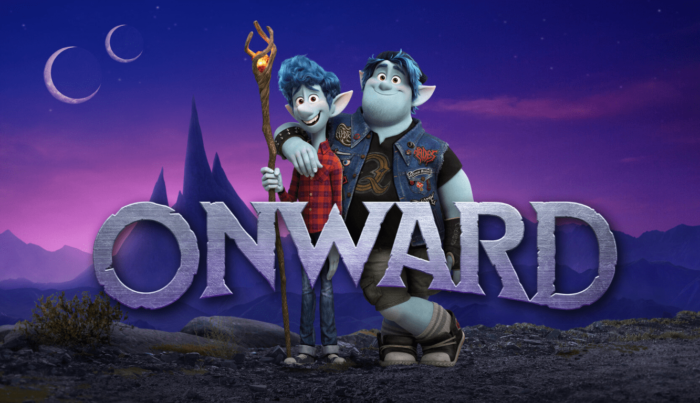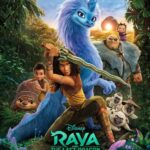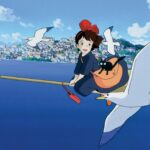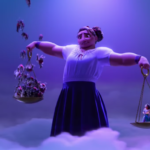Pixar’s ‘Onward’ Wears the Symbolism of Pants
After the recent (little-watched) Academy Awards event with its acclaim for Pixar’s Soul, we turn our attention to the studio’s other 2020 animated film. If from here you travel onward, be warned: spoilers haunt these grounds.
Pixar trailers have never excited me, but I especially failed to enjoy Onward’s first teaser. Its modernization of fantasy elements struck me as Shrek-like, so I expected the film to be as cynical as Shrek. I like my fantasy earnest, not self-mocking.
However, when I finally watched Onward, it seemed delighted in the very earnest-fantasy things I’d assumed the film would mock. Its scenarios brought me pure enjoyment and great satisfaction in its deeper themes. These later brought an emotional impact that probably devastated me more than any other Pixar film, including Up.1 What was so devastating? It was something about their dad’s pants.
Stumbling through the story
Barley’s and Ian’s resurrection of their dad failed and only brought back his pants. From this moment, I constantly fought a sick feeling of wasted opportunity. Of time’s cruelty. Of the deficiency of their dad’s partial, stumbling return versus what they needed from their dad. Even hilarious moments left me sick with regret when I remembered the time lost to the joke.
My husband, who lost his father at an early age, laughed way more than I did at the boys’ attempts to make their dad’s lower half look more natural by using a stuffed shirt and sunglasses as his top half. (These scenes made me struggle with more regret-sickness.) But at the film’s end my husband commented, “It was a good film. And the ending was satisfying. But at the same time, there was something so bitterly empty about it.”
I agreed. Onward just felt insufficient. Of course, the film actually seems aware of this. It even presses into this feeling. Their father has become a pair of pants, only able to communicate with them through foot taps. This poignantly and constantly reminds us that this is not enough. Yes, the result of the whole desperate quest is to give only a few seconds for one of the boys to visit with his dad. I get the sacrifice and the great Pixar message in all of it. But that still smarts.
The bitter truth
But the more I thought about it, the more I thought this feeling was appropriate. Losing your parent is not a tragedy that can be easily solved. After all, what if the boys had a perfect resurrection and gotten to spend twenty-four hours with their whole dad? Then their life would have gone on just as it had before. They would have more good memories to consider, but also that same gnawing emptiness—perhaps a hole they would feel even more deeply than before.
That rings true. When you lose a parent, you can’t recover, not even if you’re learning a Pixar lesson while doing it. We can’t kid ourselves that losing a parent is anything but a loss. That’s something this film examines far more honestly than many Disney movies, in which parental deaths are more like plot devices.
In fact, it is this sad and inescapable insufficiency—this physical representation of loss in the form of their dad’s funny, pathetic legs—that causes the boy’s quest. When it’s over, they could not have grown by having their desires so easily fulfilled.
Unraveling Pixar’s formula
Onward’s symbol of the father’s pants illustrates how absence can have just as much presence as actual presence. As the boys develop during their quest, they have been traveling with a literal part of their dad. But only part of him. Their father’s lower half shows his influence in their lives all along, by both his early presence (he is forever their dad and will always be part of their lives) and his later absence (he is gone and won’t be fully coming back).
Pixar films often end with the protagonist not getting what he wants, but learning to desire something better instead.2 This can help bring us the very true understanding that what we often think we need isn’t actually what we need. That’s a message that resonates deeply with something at the core of us.
But this film subtly veers from that pattern.
Yes, at the end, the hero doesn’t get what he always dreamed would make him happy. That’s typical Pixar. Yet, unlike the other Pixar films, Onward’s does not suggest they didn’t need their dad after all or that they shouldn’t have wanted him in the first place. Onward acknowledges they did need their dad but also the bitter reality that he is gone. The film never downplays or negates their felt need.
Some things you feel you need can’t be obtained. These needs can either hold you back, as Ian experienced at the film’s beginning. Or they can actually prove redemptive, helping you grow. Loss hurts, and don’t let anyone (or any film) tell you it doesn’t. Yet, we find growth and a fulfilling life. Hence, we go onward.









































Insightful take on a great film! I agree that Pixar did well with acknowledging pain and loss instead of glossing over it. The brother theme was also beautiful—showing that other relationships can grow more significant against the backdrop of loss.
Also, the humor is fantastic for fantasy lovers. The DnD tropes are particularly entertaining.
Sadder than Up? Hmmm. It didn’t make me bawl like Up did, but Carl and Ellie did have a full life together, while Ian and Barley miss out on all the moments that could have been. I think it is more poignant in that way.
So true–I think “my people” made this movie. People who love fantasy enough to make fun of it–but not TOO much. 😉
Your thoughts on different KINDS of sadness are so interesting! The sadness over losing what you had vs. the sadness of not getting the chance to have… I had never thought about it, but the pangs from each actually feel different. Makes me wonder if it a “preference” for one over the other is nature or nurture? In any case, it’s an interesting gateway into talking about categories of sadness in stories, just like there are different types of fear (not in degree, but in the very KIND of fear; i.e., horror vs. terror) in horror stories! Has anyone ever categorized different kinds of sadness, I wonder? I will have to ponder this more…
Onward is a movie that I want to like sooooo much. It’s just… it’s just 99% perfect. Which makes that last 1% such a thorn.
Having my own copy and watched it a few times, I think the problem is the beginning. There’s just not a proper set up for the ending the film wants to have. First, I think the opening is just a little too frantic. I know why they did it the way they did, that they wanted to show us a typical day, but it also keeps the audience from getting a proper grip on the world and characters.
Second, we’re not really given much of a sense of the conflict between the brothers. Act 1 is really good at giving us a sense of how much the Ian wants and misses the father he never knew. However we’re never told nor shown what this same emptiness means for Barley until nearly act 3. And act 3 is where they want to pay off that the older brother was far more impacted by the loss while Ian had Barley all along. If anything, the van was more set up and paid off with Barley than the father was.
Third, I think the opening narration does a disservice (and I wish more movies involving magic would stop with those). For one thing, a part of the conflict of the movie is over magic, which means it is a representative of the core of the film: the brothers’ relationship. By establishing at the start that magic is real and all in this world, it ends up weakening all of the brothers’ arguments – because we know fundamentally that Barley is right and Ian is wrong. The prologue should have been cut and whether magic is real or not should have been left more ambiguous at the start. (I was never clear on exactly magic’s position in the world – everyone seemed agnostic on it but… why?) Then let the brothers’ adventure and discovery that magic is real also be the audience’s discovery as well.
So yeah, just a slight tweak on the opening, and I think the whole movie would land better.